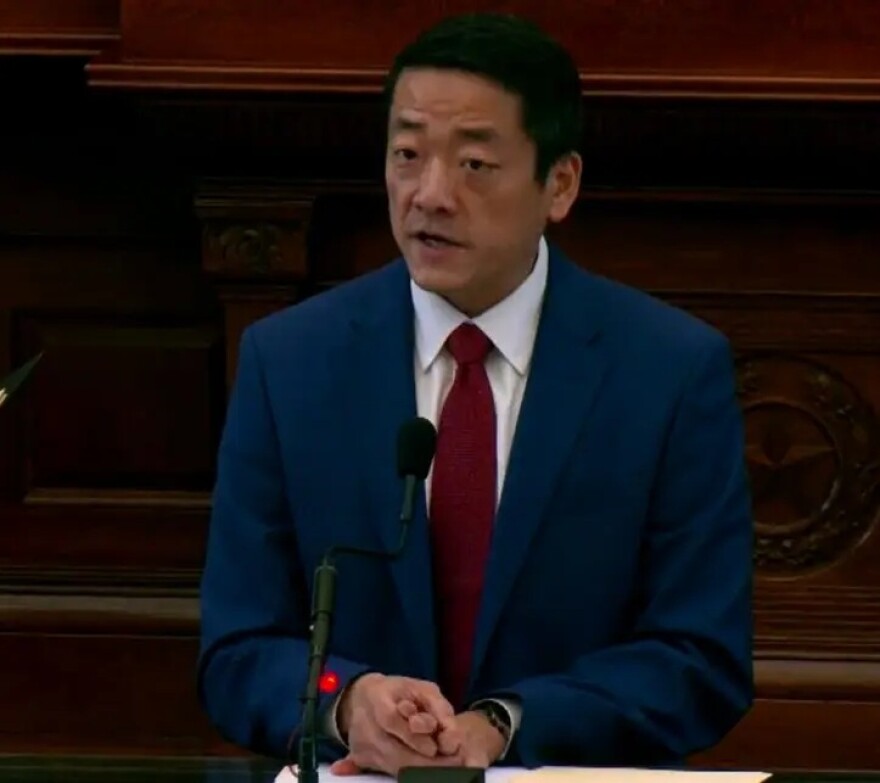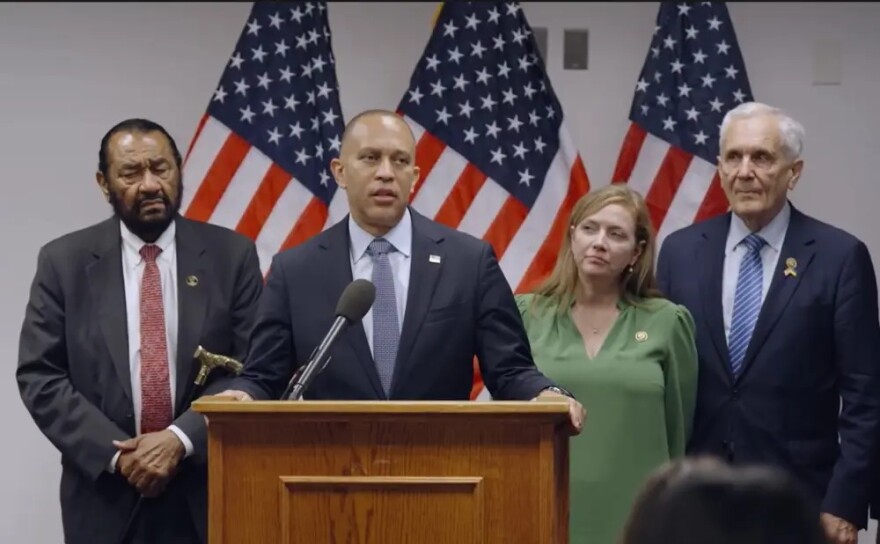The Texas State Legislature's special session opens at noon Monday. While disaster recovery and preparedness are at the top of many Texans' minds, a rare mid-decade round of congressional redistricting will take up much of lawmakers' attention over the next month.
Texans were still absorbing the shock of the deadly Hill Country flood when Gov. Greg Abbott proclaimed the agenda for the special session. Congressional redistricting sat near the bottom of a list of 18 priorities.
"This is like you’re using one of the absolute worst tragedies that has hit Texas families in a long time, since like Uvalde, and use that to give yourself a political advantage. What kind of craven, disgusting political maneuver is that?" said state Rep. Gene Wu (D-Houston), who heads the Texas House Democratic Caucus.
‘Unconstitutional racial gerrymanders’
Abbott's move followed intense pressure from President Donald Trump, culminating in a letter to Abbott from the Civil Rights Division of the U.S. Department of Justice (DOJ). The letter identified four congressional districts – representing communities in which Black and/or Latino residents make up a majority
U.S. House Minority Leader Hakeem Jeffries (D-New York), speaking at a press conference flanked by other Democratic congressional leaders and members of the Texas Democratic congressional delegation, blasted Trump for contributing to the Hill Country disaster by firing hundreds of critical employees from the National Weather Service.
"But instead of addressing the serious crisis that has affected tens of thousands of lives in unthinkable ways, Donald Trump, House Republicans here in Washington, and Governor Abbott are conspiring to rig the Texas congressional map as part of an effort to disenfranchise millions of people in Texas," Jeffries said.

The four congressional districts identified in the Justice Department's letter include: Houston’s 9th, 18th and 29th, and the Dallas-Fort Worth’s 33rd. The 18th District has been vacant since the death of Sylvester Turner in March; the other districts are held by Democratic Reps. Al Green, Sylvia Garcia and Marc Veasey.
Rep. Lloyd Doggett (D-Austin), dean of the Texas congressional delegation, ridiculed the Justice Department's argument.
"The fix is on," Doggett said, "and the absurdity of the justification for this redistricting is that a Republican-controlled legislature led by President Trump’s campaign manager in the Senate, signed by his loyal follower, Governor Abbott, that that Republican redistricting plan discriminated against white people in Texas – not a big problem that we’ve ever had down there in my lifetime."
The move towards redistricting comes at a time when Texas is fighting a legal challenge of its 2021 redistricting plan in federal court. Despite the Hispanic, Black, and Asian population growth driving the state's overall population growth over the previous decade, the 2021 redistricting plan did not add a single congressional district where any of those groups – either individually or in coalitions – could hope to elect a representative of their choice.
"You had Ken Paxton, the attorney general of the state of Texas, just a few weeks ago, in open court, on the record, under oath, saying that it was absolute nonsense, unsubstantiated nonsense, that the state’s redistricting maps, previously, had any kind of racial bias," Gene Wu said. "And now, right when Donald Trump says, ‘I want new maps drawn that are in favor for me,' DOJ comes out with a letter saying, ‘Oh, well, there was racial gerrymandering.' Well, who’s lying? Is Attorney General Ken Paxton lying under oath, or is Donald Trump lying?"
The consequences of redistricting
Michael Adams, a political scientist at Texas Southern University who focuses on elections, said any redistricting plan Republicans are likely to pursue will focus on reducing the voting power of Black and Latino residents, either by compressing them into fewer districts (a concept known as "packing") or by lumping them in new districts with larger numbers of white, conservative voters (a practice known as "cracking").
"We’re not using poll taxes and literacy tests today," Adams said, "but you’re using computer algorithms and artificial intelligence to come up with maps and stuff like that to favor your party over another."
Adams added that there's an additional way that Republicans could wind up reducing the voting power of nonwhite Democrats, particularly Blacks.
"If you feel that your vote has been diluted," Adams said, "you may lose some interest [in voting], and we have seen in recent elections in terms of low voter turnout. And why would you want to do something to decrease low voter turnout, unless you were a Republican, in terms of drawing the maps?"
Congresswoman Lizzie Fletcher (D-Houston) decried the move as treating voters like commodities. She said it was something about which all Texans, regardless of party, should be outraged.

"What [Republicans are] trying to do is change the maps, change the game, not win on their policies, not win on their ideas, not win on their records, but dilute the voices of Texas voters, dilute the ability for Texans to have their say about what they’re doing," Fletcher said. "And it's really important to understand that every single congressional district in Texas that is held by a Democrat represents the candidate of choice of minority voters across our state. So, an effort to eliminate any of them is an effort to dilute the voices of Texas voters and of minority communities in particular."
Luke Warford, a Democratic strategist with the Agave Democratic Infrastructure Fund, framed the matter another way. By focusing on redistricting, he said, Texas Republican officials are wasting time and resources that would be better spent coping with more urgent problems, such as those posed by the Hill Country flood.
"We’ve got Republicans focused, instead of solving these incredibly urgent life-and-death problems for Texans, that they’re focused on political power grabs, that they're focused on playing political games, that in this case, they’re just trying to do what Washington, DC is telling them to do, and Washington elites are telling them to do," Warford said. "And the reality is that when you look at how many things that Texas Republicans are trying to do during this short legislative session, the result is going to be poor policy making."
Houston Public Media reached out to Governor Abbott to ask why he had chosen to add redistricting to this 30-day special session, rather than calling a separate special session afterwards to deal exclusively with that issue. Abbott's press secretary, Andrew Mahaleris responded with a written statement.
“While partisan activists focus solely on political issues, Governor Abbott is dedicated to delivering results on issues important to Texans, such as flood relief, property tax cuts, and the elimination of the STAAR test," Mahaleris wrote. "The Governor looks forward to the legislature addressing these topics, along with other critical issues, during this special session.”
Houston Public Media also reached out to multiple Texas Republican members of Congress and Republican state lawmakers to ask about redistricting. None of them were available to comment.
‘Fight or lose’
Congressman Al Green called the mid-decade redistricting round "a racist power grab" and said he's prepared to file fresh impeachment charges against Trump in response to it.
"And for those who live outside of the state of Texas, beware. This is not going to end here. This is the beginning. It will reach your state at some point. If they can succeed with this theory of Black people and brown people not being able to coalesce and represent each other in Congress, it will continue. It won’t end here," Green said. "If you’re not prepared to fight, I think you have to be prepared to lose. I am prepared to fight."
Congresswoman Sylvia Garcia, who represents another targeted district, echoed that call. But she said there's little Democrats can do in the short run to prevent the Texas Legislature from redrawing the maps.
"Regrettably, you know, they have the votes," Garcia said. "So, unless we fight back — and we intend to fight back, and we fight back strong and make sure that our voices are heard — we may end up with a very, very different map, and people are going to be confused, not knowing who their rep is, and what’s going on. So, it is truly a sad state of affairs."
Democratic strategist Luke Warford explained what fighting would mean.
"For Democrats, we should be fighting in the courts, but we should be fighting at the ballot boxes and in the lead up to elections as well," Warford said. "And that means recruiting the strongest candidates possible, people who can articulate why what’s happening is so deeply undemocratic and deeply unfair. It means making sure that they’ve got good messages and strong staff, and we’ve got an effective Democratic organization that can, an ecosystem that can support them and help them win."
‘It's basic math’
According to Punchbowl News, which broke the story, President Trump told the Texas Republican congressional delegation he wanted to pick up five seats. It's not clear where Republicans would look to gain that fifth seat. One potential target is Texas Congressional District 30, represented by Congresswoman Jasmine Crockett (D-Dallas), the sole Black Texas Democratic member of Congress not singled out in the DOJ letter. Crockett is a fierce critic of Trump's.
GOP strategist Sara Marie Ridley admits that Republicans are running a calculated risk by trying to flip so many seats in redistricting. But she said any concerns about the process are overblown.
"I think that this isn't as dramatic as people think," Ridley said. "And at the end of the day, voters are going to have the power to determine their representation, and so if you really don't like it, then use it to motivate voters who may otherwise have stayed home."
Washington State Congresswoman Suzan DelBene, chair of the Democratic Congressional Campaign Committee (DCCC), said flipping five seats, or even four, might be a bridge too far for Republicans. That is in large part because Texas Republican state lawmakers did such an effective job in maximizing their gains in 2021.
"Any new map that Texas Republicans draw will almost certainly increase the number of competitive districts, thereby endangering more Republican incumbents," DelBene said. "It’s basic math. For them to try to break up Democratic-held districts, they will have to weaken Republican districts who already are facing political headwinds."
DelBene went further, saying that such a move could backfire on Republicans to the point of costing them their majority in the narrowly divided House of Representatives.
"Make no mistake," DelBene said. "The DCCC will recruit aggressively to unseat any and all newly vulnerable Texas Republicans that go along with this corrupt ploy.”

